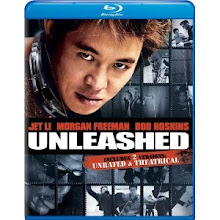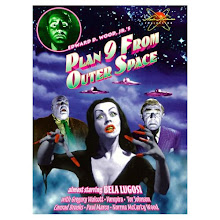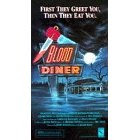An ocean of oil under the grownd ready to erupt with tremendous force. What a great dramatic image.
I'll gladly be the first to stick up for the movie. First of all, you should understand that to me to compare a movie to The Deer Hunter or Apocalypse Now is very high praise. I guess the issue of how "exciting" these films are depends on one's definition of excitement. For me, it's thrilling and extremely entertaining to watch the friction and tension between Plainview and Sunday unfold such as when Plainview denies Sunday the chance to bless the well at the ceremony. It's a small thing I guess, but I loved it, I think I laughed out loud, not because it was funny but because I could feel incredible tension brewing. Actually it begins before that when Plainview first eats with the Sundays, and Eli isn’t fooled by the quail hunting front Plainview poses, and you can really see the blood boiling under the mustache.
Jason described wishing the film’s tension and characters had escalated as the film progressed. I don’t know why our experiences were so different watching, but that’s exactly what I felt happened. The thing is, Plainview isn’t just a one dimensional character, he has many aspects to his bizarre personality and he goes back and forth between the man who sees nothing to love in humanity to the man who really seems to want a meaningful relationship with his son and fake brother. The most telling moment in the film is his celebratory dance when they discover the ocean of oil under their feet at the same time little H.W. is going deaf in the arms of strangers. He’s made his choice already but even in his twisted view of the world, he knows this isn’t right which causes him real guilt when facing accusations either real or imagined that he is a neglectful father.
One day, I’m going to come to you in the middle of the night and cut your throat!
As for the ending, I wouldn’t change a thing. It’s full of resolution. We see the conclusion of two very important relationships in his life. It’s not a very pleasant resolution, but why would it be? This isn’t A Christmas Carol, this man didn’t learn anything. He embraced the “competition” in him and clung to his view of other human beings as not worth loving. He chose a very isolated life looking for gold and oil all apparently to prove something to others--to gain advantage over them or whatever. Along the way he stumbled into fatherhood which should have proved to be very gratifying in the long run. But raising the boy always took a backseat to that original pursuit and at the film’s end when he’s achieved that success and now has nothing to pursue, he looks around and finds his son no longer wants to be associated with him. So he throws him out and disowns him. That’s how he treats family. Unfortunately for Eli Sunday, his enemies don’t get such kind treatment. In addition to Plainview getting his fortune and success, he ultimately also gets his revenge. He humiliates then kills Eli. We are left feeling very empty and dissatisfied emotionally which is exactly how we should feel. This character devolves into essentially and animal--worse actually because animals don’t kill for revenge or fun. He lets evil overtake him. It’s a powerful message that doesn’t give a happy feeling, but that doesn’t mean it doesn’t have resolution and dramatic power. I for one was very happy to be in Paul Anderson’s hands for 2 ½ hours watching this wonderfully rich psychological movie unfold in completely surprising and unexpected ways. I had a nearly identical experience the first time I saw his masterpiece Magnolia.
On a side note, didn’t you all find it odd that when Robert Elswit accepted his Oscar for best cinematography he said they were all just standing on the shoulders of Lewis’s performance. It’s an amazing performance no question, but I felt like all the attention on Lewis overshadowed P.T. Anderson’s incredible direction.
Also, I will write a comment on Badlands soon, which, spoiler alert, I also love.
Wednesday, September 24, 2008
Subscribe to:
Post Comments (Atom)






























































3 comments:
Jason wrote:
Barrett, as always, I am enlightened by your comments.
For example, I didn't recognize (neither time I saw this film) that Plainview was just then discovering an ocean of oil beneath the ground at the same time his son was going deaf. I never made that connection. ... Really?
Yes, the tension built and Plainview even murdered people, but the madness that seems to be contained in this character should have led him to Scorsese-esque outbursts of unthinkable violence, a monstrosity of a man unleashing frequent atrocities.
At the very least, the guy he kept threatening should have gotten it. I mean, I'm not a blood-luster, by any means, but Plainview's empty threats rob him of some of his bona fide psychopath street cred.
Anyway, it was hilarious how you pointed out that this movie wasn't "A Christmas Carol," ending with Plainview having a change of heart and comfy closure.
It is a good film, but who would have ever guessed from its opening scenes that it would end with him on the floor of a bowling lane ... "The Big Lebowski," yes, but this movie, no.
Well, I guess the point I was trying to make in pointing out that Plainview was dynamic--not just pure evil or a raging psychopath, is that it is a little more powerful to me that way, and more believable and tragic. The wonderful thing about the Plainview character and Lewis's performance is that this man is conflicted and tormented by himself. When he's yelling "I've abandoned my boy!" I believe his pain and regret. When he sobs after killing his fake brother, I believe his remorse and loneliness. And when he yells at H.W. that he was a bastard in a basket, I believe that his rage stems from his desire for H.W. to stay with him and not leave. But why can't he say any of that? Because that would mean at some point admitting that everything he loved and pursued was not as valuable as he made it out to be--which would mean admitting he was wrong. That's why the ending with Eli is so perfect. He gets one more chance to prove he is smarter than someone--to win another battle. He's not a psycho killer. He's a competitor whose hell bent on proving that he's better, smarter and happier than everyone else. I've seen that kind of pride and stubbornness--not to this extent perhaps, but I believe it and understand it. This for me transcends mere cinematic spectacle and truly taps in to the darkest aspects of human nature.
Well, Mr. Hilton, I can't say I have any arguments for your last comment. It was like Dan 'Russo's crane kick: It has no defense.
Yet, it was funny how, in "The Karate Kid, Part II" that wily Chozen seemed to be able to defend against the crane kick. Only in the '80s could we have a movie named "The Karate Kid."
But seriously, I liked your insights into the complexity of the oil man's dark nature.
Post a Comment